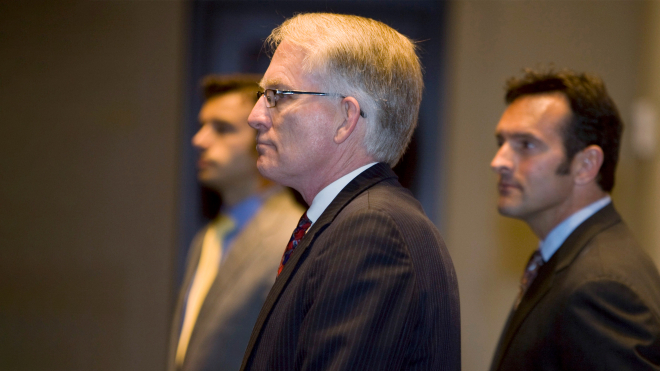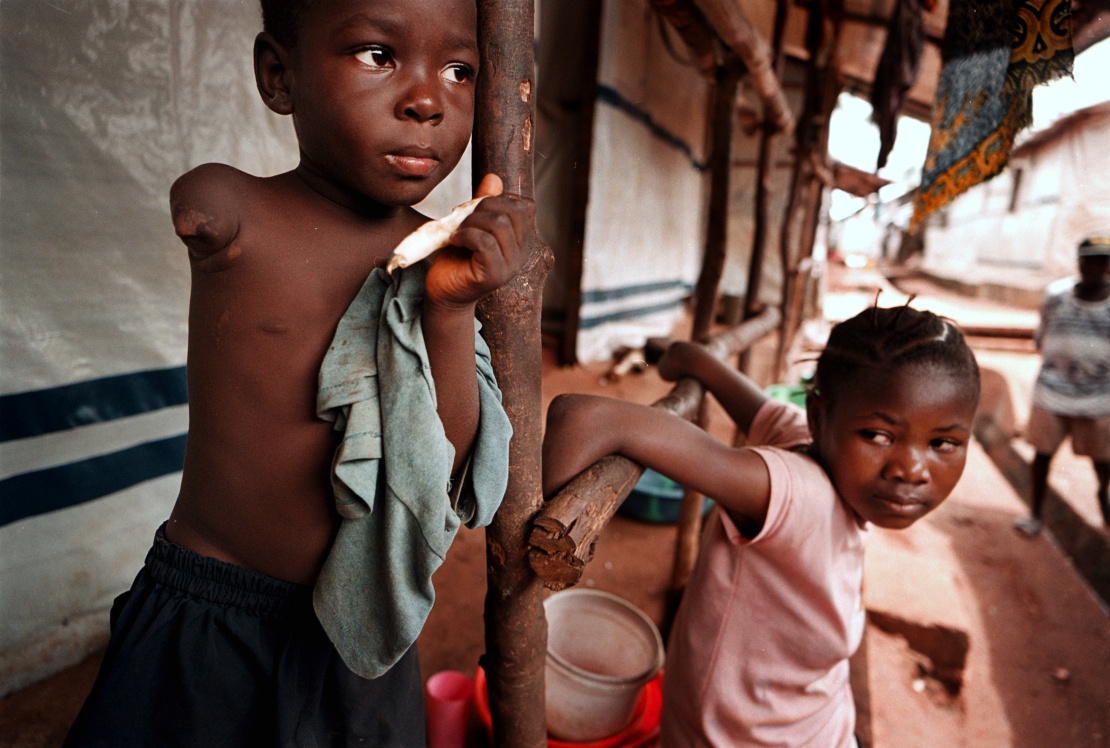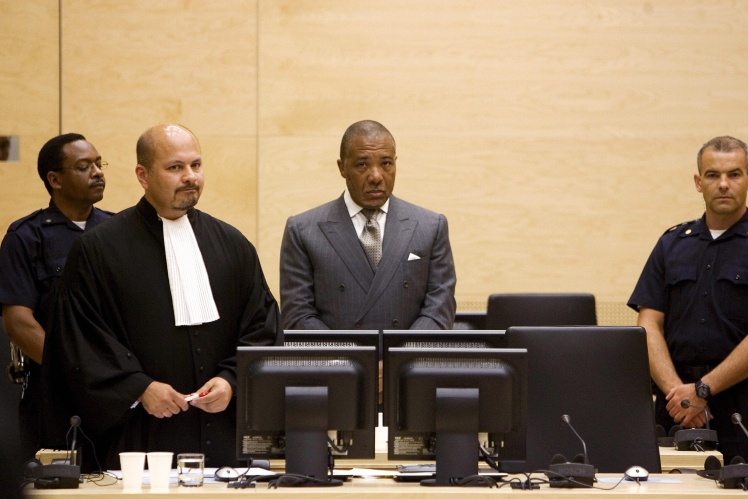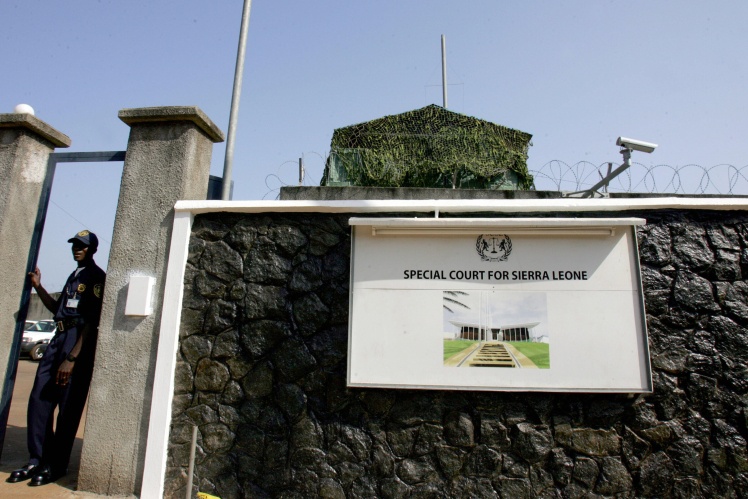You indicted the President of Liberia, Charles Taylor, for what happened in Sierra Leone. He supported the rebel movement in the neighboring country, although he was not yet the president of Liberia. Why did he do it at all?
What happened in Sierra Leone is part of a bigger picture, we call it the West African Joint Criminal Organization. It included the President of Libya, Muammar Gaddafi, and the President of Burkina Faso, Blaise Compaore. They wanted to take over all of West Africa and use the region for personal gain.
In the end, Gaddafi was to become the emperor of Africa. In West Africa, they wanted to test their ambitions and plans. By that time, they had already gained control over Burkina Faso and wanted to act in the same scenario in Guinea, Senegal and Gambia. What Taylor was doing with Sierra Leone was a test to see if they could go on.
In March 1991, rebels invaded Sierra Leone and immediately began to terrorize the local population. The main goal was to seize the eastern regions of the country, where diamonds were mined. You have probably seen the movie Blood Diamond with Leonardo DiCaprio — it actually tells about the blood diamonds of Sierra Leone. They needed these stones to finance the rebels and Taylorʼs revolution in Liberia.
During the war in Sierra Leone, militants chopped off peopleʼs limbs, even of small children.
Getty Images / «Babel'»
You named several presidents, but only Taylor was prosecuted. Did you try to indict Gaddafi?
Thatʼs a good question, why I didnʼt indict Gaddafi and Burkina Faso President Compaore. It was my political decision. Charles Taylor became the first sitting president to receive an actual sentence for international crimes. Now he is in prison. Itʼs not easy to bring the president to justice, I understood that our Special Court may not be able to handle three presidents at the same time, and the international community will close it. So I chose Charles Taylor, whose guilt was the biggest.
The Special Court for Sierra Leone was created quite differently from the previous International Tribunals for Yugoslavia [ICTY] and Rwanda. They were created by the decision of the UN Security Council, they used international law, and international judges worked for them. Why was the Special Court for Sierra Leone created in a different way — through an agreement with the UN, and it included local judges?
Here it is worth noting that this Special Court was also created through the UN Security Council. In August 2000, President Ahmad Tejan Kabbah of Sierra Leone appealed to UN Secretary-General Kofi Annan to establish an effective tribunal to bring to justice those responsible for the killing and maiming of more than 1.2 million people in West Africa. The Security Council passed a resolution requesting the Secretary-General to negotiate an agreement between the United Nations and the government of Sierra Leone. Such an agreement created a Special Court for this country. At that time, there was no International Criminal Court that could investigate these crimes. And the world was dissatisfied with the work, and especially with the cost of the two International Tribunals for Yugoslavia and Rwanda. At the time, each of them cost about 130 million to a billion dollars a year. Because of this, all politicians and diplomats said that international justice is too expensive. Annan agreed that something had to be done in West Africa, but more efficiently, effectively and, frankly, cheaper. This is how the worldʼs first international hybrid tribunal was created, in which I had the honor to work.
Can you explain exactly how the hybrid tribunal was arranged?
What does hybrid mean? This means that both international and local lawyers worked in the court. For example, the prosecutor is international. The deputy prosecutor is from Sierra Leone. The secretary of the court is from among foreigners, and his deputy is from Sierra Leone. The same with judges. There were two international judges and one foreign judge in the courtroom. And in the appeal — three international and two from Sierra Leone. It was the first hybrid tribunal in the world.
Was this court based on local laws or international law? And if on a local level, was the legislation changed in Sierra Leone for this tribunal?
There was no need to change anything, because the law of Sierra Leone was not applied in court. By the way, Ukrainian legislation should also not be applied when creating the Special Tribunal regarding Russian aggression.
You mentioned the cost of the International Tribunals for Yugoslavia and Rwanda, and how much did the Special Court for Sierra Leone cost per year?
If the tribunal in Yugoslavia cost $135 million a year, our court in the first year cost $25 million. We had a different way, a different management style. Colin Powell, the US secretary of state at the time, told me that the main reason I was chosen to be the attorney general was my reputation as a good manager and leader. They needed someone who would build an effective system.
The United Nations has one terrible feature — to create an office, and then create a mandate around it, and then — an office around the mandate... In short, they know how to inflate the staff there. I involved only those without whom it was impossible to work. If there were almost a thousand people working in the ICTY prosecutorʼs office, I had only 70. Another important thing: we concentrated only on those who were most responsible for the crimes, while in the Yugoslav tribunal the range of suspects was wider.
In order to try the president, it is necessary to overcome his immunity, which national courts cannot do. International tribunals such as the ICTY and the Rwanda Tribunal have been able to. How did your hybrid tribunal overcome this immunity, given that you had national judges on the court?
The national judges you speak of worked in the International Special Court. And this International Special Court had the right to investigate international crimes. I made the decision to indict the President of Liberia, Charles Taylor, for war crimes in early March 2003, and we released this information in June 2003. And I did it because there was a precedent — the decision of the International Court of the United Nations, which at one time allowed the arrest of the Minister of Foreign Affairs of the Congo, Abdoulaye Yerodiya Ndombasi. He publicly called for the killing of participants in the anti-government rebellion, primarily representatives of the Tutsi ethnic group. This decision states that heads of state lose their immunity if they have committed international crimes and these crimes are being examined by international criminal courts which have appropriate jurisdiction. Thatʼs what I relied on. The appeal court later supported us. And now itʼs a standard. It is thanks to this that we can try Putin at the international level for crimes against humanity and war crimes, as well as, if the Special Tribunal is created, for the crime of aggression.
Charles Taylor celebrates the victory over the Liberian government, which captured the airport in Monrovia in July 1991.
Getty Images / «Babel'»
You indicted Taylor in March 2003, but withheld the information. It became public only in June. Why were these pause and secrecy regime?
There are two aspects here. The first is a security issue. Unlike other tribunals, ours did not take place in The Hague, but in Freetown, the capital of Sierra Leone. Actually at the scene of the crime. There were enough people around me who did not want President Taylor to be indicted. Because of this I had to be very careful.
The second aspect is that I wanted the whole world to notice it. Taylor went to a peace conference in Ghana. On June 3, 2003, at eleven oʼclock, he went up the stairs as president, and in 15 minutes he went down them as a war criminal, because his fellow heads of state asked him to leave and return to Liberia. Two months later, he was removed from power, resigned, and placed under house arrest in Calabar, Nigeria. This was the beginning of the end for President Taylor. In fact, the same fate may await Putin.
This photo of Charles Taylor with model Naomi Campbell was evidence at his trial. In 1997, after lunch at the then president of South Africa, Nelson Mandela, Taylorʼs men presented Campbell with diamonds from Sierra Leone. So they proved in court that he had access to them.
The New York Times / «Бабель»
The International Criminal Court issued an arrest warrant for Putin in March of this year. How long can the ICC take to prepare an indictment?
This is at the prosecutorʼs discretion. I suspect it will happen this year. He will be accused as a war criminal and as an aggressor, and this will limit his options. He will eventually lose the respect of other leaders. Itʼs interesting to see how the world is slowly but surely getting closer to taking down dictator Putin with the force of law, not guns.
Even now, if he goes to any country, it will be obliged to detain him and hand him over to the International Criminal Court. But remember, I had to spend two years trying to get the international community to make a political decision about Taylor. It was handed over to our court only in 2006. He appeared before the Special Tribunal at the age of 64 and received a 50-year sentence, so he will spend the rest of his life behind bars.
Former President of Liberia, Charles Taylor, during the session of the Special Court for Sierra Leone. The building of the Special Court.
Getty Images / «Babel'»
Indeed, Putin can hardly travel the world, but the BRICS summit is to be held in South Africa in August. And itʼs still not completely clear whether Putin will come there or not. South Africa is a member of the International Criminal Court and must comply with its requirements, but it already talks about security guarantees for all participants. There is no clear statement that if Putin arrives, he will be arrested. Once, South Africa already ignored the request of the International Criminal Court and did not arrest the ex-president of Sudan, Omar al-Bashir, who is also suspected of international crimes.
South Africa is playing a dangerous political game for which it will pay. But I think that Putin will not go to South Africa.
Even if Russia or someone else doesnʼt extradite him, he will still be charged, he will die a man accused of international crimes. This is how he will go down in history.
At the same time, it cannot be ruled out that under certain conditions the Russian government will hand over Vladimir Putin to the International Criminal Court or the Special Tribunal. It is not only about Putin. Sooner or later, the Minister of Defense of Russia, the Minister of Foreign Affairs, and the higher military command will be held accountable for crimes in Ukraine.
How did you determine which cases should be considered by the Special Court?
The chief prosecutor is the person who decides who to indict and what to incriminate them. I prosecuted only the people who caused the most damage.
I had four groups of suspects: the Revolutionary United Front, the Armed Forces Revolutionary Council supported by Charles Taylor, and the Civil Defense Force, a militia that supported the government. And Charles Taylor separately. So I decided to prosecute Charles Taylor and the three leading members of each of these groups.
Previously, there were no precedents for holding the countryʼs leader — a permanent member of the UN Security Council — to account for a violation of international law. How realistic is it now?
It canʼt be done via the Security Council, because a permanent member of the Security Council is a criminal. But trying Putin is real. I have already proposed a plan, and it was demonstrated to President Zelensky. This plan is based on the success of the Special Court for Sierra Leone.
The UN General Assembly can adopt a resolution recommending the Secretary General to conclude a bilateral agreement between the UN and Ukraine. Likewise, through the General Assembly, we created Special Chambers for Cambodia and two mechanisms for Syria and Myanmar. So, the precedent exists, everything is possible.
David Crane continued to work on international crimes after retiring as a prosecutor at the Special Court for Sierra Leone.
Getty Images / «Babel'»
But in order to pass the resolution, we need significant support from member states of the UN General Assembly. It is not easy, many of them are under Russian influence. In addition, some countries of the democratic world also do not want to support the Special Tribunal for Russiaʼs aggression in the form proposed by Ukraine. Do you think it is realistic to get votes for such a resolution?
Iʼm sure itʼs real. Yes, there will be countries that will vote against. Dictators around the world do not want the Special Tribunal to be created. However, about 140 countries vote on the side of Ukraine in the UN General Assembly. This is much more than necessary. And it is important to remember that every country has one voice, regardless of whether it is as big as China or as small as Liechtenstein. Of course, Russia, China, North Korea, and Iran will be against it. India and Brazil fluctuate. Brazil has just changed its government and it is much more liberal than the previous one. Potentially, Hungary may not support the decision because of Orbán. However, Ukraine must gather the necessary votes and initiate the voting. The main thing is to be sure that there are enough votes, it is impossible to fail this vote.
If the Special Tribunal is created, but Putin is not extradited by then, is it possible for the process to take place without him? The International Criminal Court definitely does not do this, but there were such precedents in international law.
It is indeed possible. If the international community allows this to happen, it should be spelled out in the statute of the future Special Tribunal. But this is not a very good way. The accused must sit in the dock.
And remember: the chief prosecutor of the Special Tribunal for Russiaʼs Aggression will be able to consider the cases of those who incited aggression. In this way, we reach out to other countries that helped Russia: Belarus, Iran, North Korea. Potentially, they too can be prosecuted. I encourage you to do it.
There is still a war going on in Ukraine, and therefore, the number of crimes committed by Russians is increasing. Currently, more than 90,000 war crimes have been registered. They should be investigated by Ukraine, because they concern ordinary Russian soldiers, which the International Criminal Court does not deal with. Can other countries help us in these matters?
Ukraine should continue to investigate the crimes committed by the Russians on your territory. Can everyone be held accountable? Of course not.
Even in the Special Court for Sierra Leone, we did not do that. There were 30,000 people at a very low level who were not punished because the justice system in the country was simply destroyed.
But everything must be registered and investigated. The victims must understand that the government of Ukraine, the European Union, and the United Nations are doing something about them for the sake of justice.
Vladimir Putin is suspected of the illegal forced transfer of Ukrainian children from the occupied territories of Ukraine to Russia.
Getty Images / «Babel'»
What mistakes from previous experience should Ukraine take into account?
The only mistake that can be made is to do nothing to punish the guilty. If we do nothing, it will be a major failure of the system and the UN, whose sole purpose is to regulate these very things.
As far as I know, some countries want Ukraine to create a hybrid special tribunal with Ukrainian judges, based on Ukrainian law, but with an international component. Ukrainian authorities are against this. Which way is better for us?
All that is needed is an international tribunal that will have the jurisdiction to prosecute Vladimir Putin for aggression. A hybrid will not have such powers. The mixed tribunal is a worthless and meaningless tool, a waste of time and just an attempt to show that "we are doing something". Some countries, like the US, feel that this is not beneficial to them and do not want to set a precedent. The main thing is that there are no legal obstacles to the creation of a special tribunal, only politics.
Translated from Ukrainian by Anton Semyzhenko.
There is justice, and it is worth fighting for. Help us in this — support Babel: 🔸 in hryvnia 🔸 in cryptocurrency 🔸 Patreon 🔸 PayPal: [email protected]



